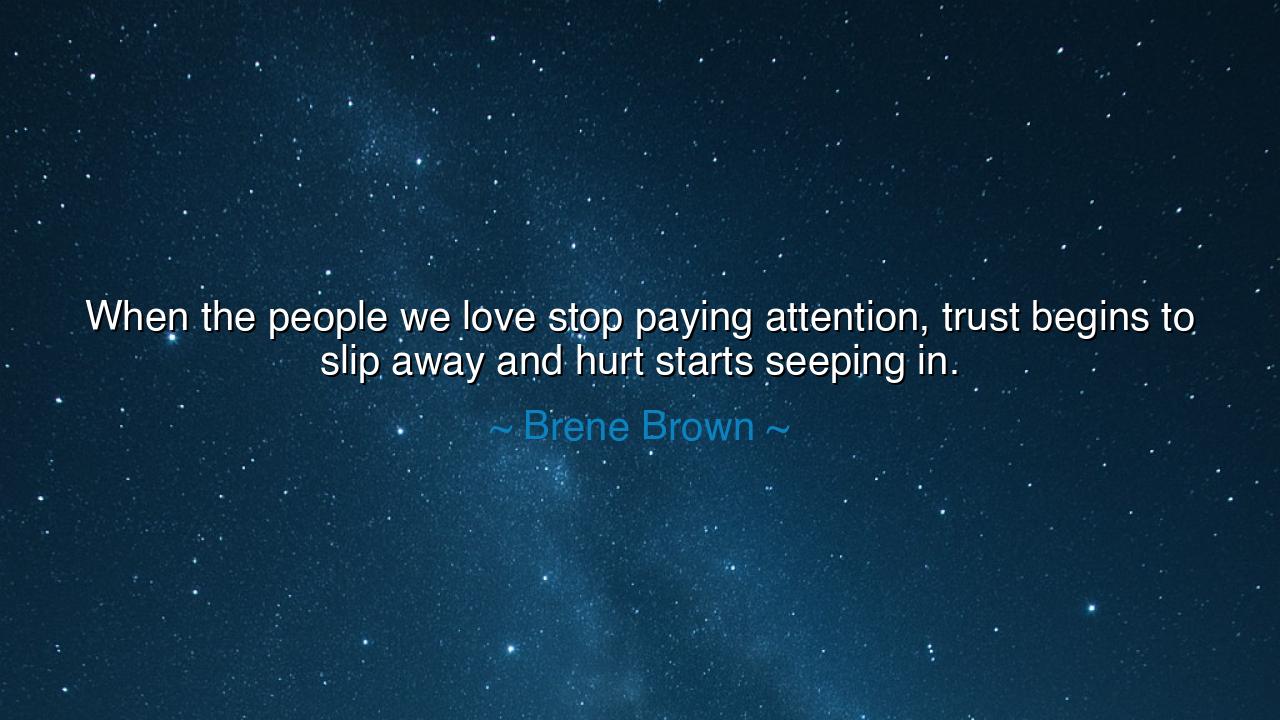
When the people we love stop paying attention, trust begins to
When the people we love stop paying attention, trust begins to slip away and hurt starts seeping in.






Hear now the voice of Brené Brown, seeker of truth in the hidden chambers of the heart: “When the people we love stop paying attention, trust begins to slip away and hurt starts seeping in.” These words are a mirror to the soul, showing us what lies beneath the surface of relationships. For the ancients taught that love is not merely fire at first meeting, nor the vows spoken once, but the daily tending of the bond. Without attention, love grows brittle, and even the strongest covenant may crumble.
To give attention is to say, “I see you. You matter to me.” It is the lifeblood of connection. When the beloved is ignored, even without cruelty, the silence becomes a wound. And in that silence, trust—that most fragile of treasures—begins to dissolve, like sand washed away by a relentless tide. Slowly, quietly, the hurt enters, filling the cracks of neglect, until hearts once close drift apart.
Consider the story of Marcus Aurelius, emperor of Rome and philosopher of the Stoics. He commanded armies, bore the weight of empire, and wrote words of wisdom that echo through the ages. Yet in his meditations, he grieved for those relationships in his life where distance grew, not from hatred, but from inattention. He reminded himself daily to honor the presence of others, to look upon his children, his wife, his comrades, not as mere shadows passing through his grand responsibilities, but as souls deserving care. History shows us that even emperors may forget, and even emperors may learn: without attention, trust falters, and bonds decay.
This teaching of Brown is not only about lovers or family—it extends to every tie of human kinship. In friendship, when one ceases to listen, the bond thins. In community, when leaders fail to heed their people, rebellion brews. In nations, when rulers close their ears to the cry of the weak, the covenant between governed and governing shatters. Thus, what seems small—paying attention—is in truth the foundation of all human trust.
O children of tomorrow, know this: attention is the currency of love. It cannot be hoarded, for it withers when withheld. It must be given freely, again and again, like water to a garden. And as the garden grows, so too does trust. Without it, weeds of resentment take root, and bitterness blooms where tenderness should have flourished.
Reflect upon your own life. Do you speak to those you love while your eyes are elsewhere, your mind divided? Do you allow the days to pass without listening, without asking, without seeing? Beware! For in such moments, hurt begins its quiet work. To restore what is lost, one must return to the ancient practice: to be present, to listen deeply, to let the beloved know they are not invisible but cherished.
The lesson is clear and sharp: if you would guard the flame of love, give your attention. Make space for those you hold dear, not only in your duties but in your heart’s awareness. Set aside distractions, lift your eyes, and be fully with them. Let your actions declare, “You are seen, you are heard, you are valued.” In doing so, you protect the fragile vessel of trust and banish the creeping shadow of hurt.
And so remember, as the ancients would command: tend daily to the bonds of your soul, for they are your true wealth. The gift of your attention is the shield of trust and the balm for every hurt. Give it freely, and your love shall endure like stone upon which even time cannot carve its ruin.






HDTran Hoang Hai Dang
It’s interesting how this quote speaks to vulnerability—when someone stops paying attention, it almost feels like an abandonment of our emotional needs. I’ve experienced this before, and it leaves me questioning the role of communication in relationships. If trust begins to slip, does that mean both people have a responsibility to fix it? How much effort should both parties put in before realizing that things might be beyond repair?
GDGold D.dragon
I agree with this quote, but I can’t help but wonder: Why is it that when someone stops paying attention, we immediately equate that with a loss of trust? What if their lack of attention is not about us at all but something personal they’re going through? Could it be possible for trust to be impacted by external factors, not just by what’s happening in the relationship itself?
NNNu Nong
This resonates with me because I’ve been in relationships where the emotional disconnect felt like a slow burn. It almost feels like you don’t notice it happening until it's too late. Can we truly stop the hurt from creeping in once trust begins to slip? If someone isn't consciously aware of their actions, is it possible to regain what was lost, or is it too far gone?
NBNgoc Bich
I love this quote, but it makes me think about the way we show attention to others. Are we always as attentive as we should be? It seems easy to overlook small gestures that keep trust strong. But if the person who is 'not paying attention' doesn’t realize the harm it causes, does that make them unaware, or are they choosing to ignore it? Does that make a difference?
MNPham Vo Minh Nhat
This quote really hits me because it touches on something I’ve struggled with before—feeling disconnected from loved ones. When someone stops paying attention, it’s like a part of you feels invisible. I’ve had moments where I’ve started to withdraw too, and I wonder if it's just human nature to drift apart when we’re not actively investing in the relationship. Have you ever found a way to fix that feeling of drift?